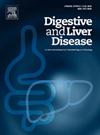阿特唑单抗-贝伐单抗治疗HCC后转为肝移植:博洛尼亚经验
IF 3.8
3区 医学
Q1 GASTROENTEROLOGY & HEPATOLOGY
引用次数: 0
摘要
免疫检查点抑制剂(ICIs)治疗肝细胞癌(HCC)取得了前所未有的应答率,为可能的降低分期或转化策略铺平了道路。然而,关于肝移植(LT)前停用ICI的最佳时机和移植排斥的风险,仍然存在不确定性。方法对博洛尼亚两个肝病中心(2022-2025)前瞻性收集的数据进行事后分析。患者接受阿特唑单抗-贝伐单抗(AB)治疗不可切除的肝癌,不适合局部区域治疗。我们报告成功降级的患者比例及其随访数据。在一个多学科小组中讨论了LT的资格。结果108例AB患者中(84.1%为男性,44.8%为大血管侵犯,21.5%为AFP>;400), 35例(32.4%)获得客观缓解。8名患者(7%)在3例达到完全放射反应后接受了肝移植,其余5例达到部分反应。当仅考虑75岁且在AB开始时无转移性疾病的人群(n=49)时,向LT的转换率为16.3%。客观反应是唯一与转换相关的变量,而没有基线变量预测这一结果。LT前AB的中位持续时间为17.6个月。从atezolizumab停药到LT的中位时间为111天(56-134天)。在标准免疫抑制方案下未观察到移植排斥反应。中位肝移植后随访9.5个月后,未观察到HCC复发。结论在接受免疫治疗的患者中,不可忽视的一部分转为肝移植是可行的。停药2个月后未见移植物排斥反应。肝移植后复发的数据仍然是初步的,但令人鼓舞。本文章由计算机程序翻译,如有差异,请以英文原文为准。
Conversion to liver transplantation following atezolizumab-bevacizumab for HCC: the Bologna experience.
Introduction
The unprecedented response rates achieved with immune checkpoint inhibitors (ICIs) for hepatocellular carcinoma (HCC) paved the way for possible downstaging or conversion strategies. However, uncertainties remain regarding the optimal timing for ICI discontinuation before liver transplantation (LT) and the risk of graft rejection.
Methods
Post-hoc analysis of prospectively collected data from two hepatology centers in Bologna (2022-2025). Patients received atezolizumab-bevacizumab (AB) for unresectable HCC not suitable for loco-regional therapies. We report the proportion of patients who were successfully downstaged and their follow-up data. Eligibility for LT was discussed in a multidisciplinary team.
Results
Among 108 patients treated with AB (84.1 % were male, 44.8% had macrovascular invasion and 21.5% started with an AFP>400), 35 (32.4%) achieved an objective response. Eight patients (7%) underwent LT after achieving a complete radiological response in 3 cases and a partial response in the remaining 5. When considering only the population <75 year-old and without metastatic disease at the start of AB (n=49), the conversion rate to LT was 16.3%. Objective response was the only variable associated with conversion, while no baseline variable predicted this outcome. The median AB duration before LT was 17.6 months. The median time between atezolizumab discontinuation and LT was 111 days (range 56-134). No graft rejections were observed under standard immunosuppressive protocols After a median post-LT follow-up of 9.5 months, no HCC recurrences were observed.
Conclusions
Conversion to LT is feasible in a non-negligible part of patients receiving immunotherapy. No graft rejections were observed after a 2-months withdrawal of ICIs. Data on post-LT recurrence are still preliminary, yet encouraging.
求助全文
通过发布文献求助,成功后即可免费获取论文全文。
去求助
来源期刊

Digestive and Liver Disease
医学-胃肠肝病学
CiteScore
6.10
自引率
2.20%
发文量
632
审稿时长
19 days
期刊介绍:
Digestive and Liver Disease is an international journal of Gastroenterology and Hepatology. It is the official journal of Italian Association for the Study of the Liver (AISF); Italian Association for the Study of the Pancreas (AISP); Italian Association for Digestive Endoscopy (SIED); Italian Association for Hospital Gastroenterologists and Digestive Endoscopists (AIGO); Italian Society of Gastroenterology (SIGE); Italian Society of Pediatric Gastroenterology and Hepatology (SIGENP) and Italian Group for the Study of Inflammatory Bowel Disease (IG-IBD).
Digestive and Liver Disease publishes papers on basic and clinical research in the field of gastroenterology and hepatology.
Contributions consist of:
Original Papers
Correspondence to the Editor
Editorials, Reviews and Special Articles
Progress Reports
Image of the Month
Congress Proceedings
Symposia and Mini-symposia.
 求助内容:
求助内容: 应助结果提醒方式:
应助结果提醒方式:


